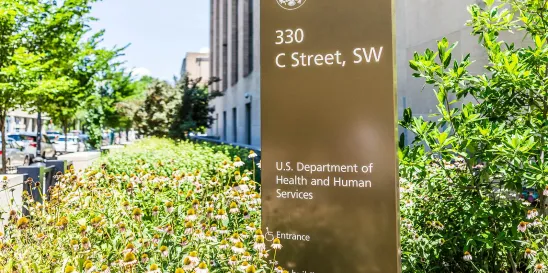As we wrote about in our prior blog post, on September 29, 2023, John D. Bates of the U.S. District Court for the District of Columbia struck down a federal rule that permitted health plans and pharmacy benefit managers (PBMs) to exclude drug manufacturer copayment (copay) assistance from a patient’s cost sharing limits. In two separate filings this week, HHS signaled that it intends to support the continued use of copay accumulator programs as the industry has been using them since 2021.
On Monday November 27, HHS filed a motion to clarify the scope of the District Court’s order (Motion to Clarify), which was followed on Tuesday November 28 by a notice of appeal to the D.C. Circuit Court of Appeals. Significantly, HHS stated in the Motion to Clarify that it “intends to address, through rulemaking, the issues left open by the [District Court’s] opinion, including whether financial assistance provided to patients by drug manufacturers qualifies as ‘cost sharing’ under the Affordable Care Act [(ACA)].” Further, and equally important, HHS stated that it “does not intend to take any enforcement action against issuers or plans based on their treatment of such manufacturer assistance” until that rulemaking is issued.
HHS’ stated purpose of the Motion to Clarify was to confirm that the court’s ruling merely vacated the Notice of Benefit and Payment Parameters for 2021 (2021 NBPP) without ordering any additional relief. However, the HHS filings also relay two significant messages to health plans and PBMs impacted by the District Court’s ruling: (1) that HHS plans to issue rulemaking to address the District Court’s concerns with the 2021 NBPP, and (2) until that rulemaking is issued, health plans and PBMs are free to operate copay accumulators as they have been since 2021 without fear of enforcement from HHS.
The HHS filings do not provide any details on HHS’s intended rulemaking, although HHS’ actions and prior statements indicate that the agency plans to use the tools at its disposal to protect copay accumulators. The most direct way to do so would be to amend the definition of “cost sharing” to outright exclude manufacturer copay assistance. While HHS would likely prefer to give plans discretion over how to treat the manufacturer copay assistance rather than outright exclude it – as it did in the 2021 NBPP – it was this discretion that the District Court primarily took issue with. Specifically, Judge Bates reasoned in his opinion that the 2021 NBPP, by giving plans discretion over whether to apply manufacturer assistance towards a patient’s cost sharing limits, “authorize[d] two courses of conduct based on two fundamentally contradictory readings” of the ACA’s and HHS’s pre-existing regulatory definition of “cost sharing.” Definitively excluding “cost sharing” to not include manufacturer copay assistance would arguably address the District Court’s primary issue with that invalidated rulemaking.
Further, HHS appears to have policy reasons to outright exclude manufacturer assistance from the definition of “cost-sharing.” As the agency made clear in prior guidance, it believes that manufacturer copay assistance “can add significant long-term costs to the health care system that may outweigh the short-term benefits of allowing [it],” a point it has reiterated throughout the government’s filings in the current litigation. The fact that HHS also appealed the court ruling indicates that the agency still views manufacturer copay assistance with skepticism, which continues to contrast with how states have approached the issue.
If anything is certain at this moment, it’s that the issue of how copay accumulators can be implemented is far from settled. The plaintiffs will certainly challenge the appeal, and there will likely be challenges to HHS’ future rulemaking on either substantive or procedural grounds. As such, even if HHS would prefer to adopt a regulatory fix quickly, it will have to contend with the fact that notice-and-comment rulemaking is an inherently time-consuming process. Rushing out a regulatory fix to address the District Court’s ruling, or using a faster method of implementing a change (e.g. Interim Final Rule), could also make future rulemaking vulnerable to invalidation by a court. Beyond these concerns, HHS and the federal government may have other structural motivations to challenge the lower court’s ruling, and a quick regulatory fix could make any appeal moot.
In the short term, however, the HHS filings give health plans and PBMs who use copay accumulators cover to continue operating the programs as currently designed. HHS has also made it clear that it is willing to use a multi-prong approach to preserve the use of copay accumulators as contemplated by the 2021 NBPP in the longer term.






 />i
/>i

